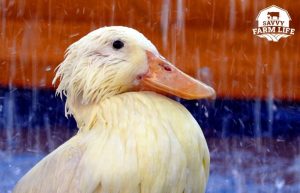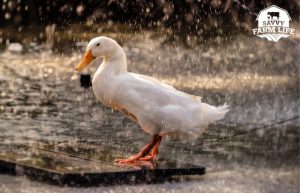
Should Ducks Be Left Out in the Rain?
Ducks thrive in both water and land environments. They are very adept swimmers and flyers with playful personalities that delight and entertain those close to them. Because of this, ducks have become a popular poultry choice for personal farms. If you’re considering raising ducks, you may have some questions about suitable environments for these caring creatures.
Can ducks be left out in the rain? The short answer is yes! Ducks love the rain and will be more than happy to be left outside during dreary weather. It’s important to provide your ducks with shelter from the rain, just in case they get cold or want a break, but most ducks will be extremely content playing outside in nasty weather.
Just because ducks love the rain doesn’t mean they don’t require special attention and care on dreary, chilly days. Cold and wet environments can cause any animal to suffer from hypothermia, which can be fatal. To learn how to care for your ducks in the rain, read on!
Why Do Ducks Like the Rain?
Ducks Are Waterfowl
Ducks belong to the waterfowl category of birds, meaning that they do well in both aquatic and land environments. They enjoy having a good balance of access to water and dry land as both habitats are necessary to their normal functions.
In the wild, for example, ducks often forage for food in natural water formations, like lakes and ponds. They feed on aquatic vegetation and small insects, such as mollusks, crabs, and frogs.
Ducks Bathe in the Rain and Water
In addition to feeding in the water, ducks also use the water to preen their feathers. Usually, ducks have a set routine of preening, fluffing, and cleaning their feathers before they take a nap. They need to be in the water to accomplish this process, as it serves as a vehicle to spread natural, water-resistant oils around their feathers for protection.
Ducks will also dunk their heads in water to clear their eyes and airways. Without this behavior, a duck’s nostrils and eyes can be stuffed up with gunk, causing them to become sick.
To learn more about duck preening and sleeping habits, check out my article Where Do Ducks Sleep? Ultimate Duck Sleeping Behavior Guide. You’re bound to learn some fun facts, such as how ducks sleep with one eye open to avoid surprise predators!
Ducks Play in Rain
Now that you understand why ducks require water, hopefully, you can see how the rain would be a perfect gift for them! Ducks, beyond all else, are playful creatures who love to splash around in the water (they’re also notoriously messy, so be careful!). The rain presents the perfect opportunity for ducks to slosh around in puddles or forage for worms and insects.
Will My Ducks Get Cold in the Rain?
 Ducks are extremely capable of handling the cold due to their thick layer of body fat and feathers. Fully grown duck feathers are hearty and provide natural insulation to the duck, protecting them from wind and even snow.
Ducks are extremely capable of handling the cold due to their thick layer of body fat and feathers. Fully grown duck feathers are hearty and provide natural insulation to the duck, protecting them from wind and even snow.
In the wild, it is very uncommon for a duck to freeze to death due to its migratory patterns and natural insulation. They also have special techniques to keep themselves warm on cold nights, like sticking one foot up into their bodies to provide extra warmth. Ducks will also often put their bills back into their feathers to conserve as much body heat as possible.
While ducks are well-protected against the rain, they may still get cold or scared from extreme winds. They can also develop hypothermia is the conditions are too cold and wet. This is why it’s best to provide them with shelter in times of heavy downpour, just in case they have a change of heart and need some extra insulation.
Duck Shelter Guide For Rainy Days
I’ve mentioned that providing your ducks with adequate shelter during a rainstorm or bad weather is necessary to their well-being, but you’re probably still wondering what exactly makes a shelter adequate?
Duck Shelter Requirements
Ducks are fairly easy to create shelters for as they’re not picky and tend to produce more natural body heat than chickens. All you need for a proper duck shelter is a well-ventilated coop or lean-to with a lining of straw on the bottom to keep the ducks’ feet warm. You’ll also want to make sure that the shelter stays dry even if it’s raining outside.
Ducks Sleep on the Ground
Ducks, unlike chickens, don’t roost in their shelters, so there’s no need to provide them with boxes or enclaves to sleep in. They are perfectly happy to settle into some straw on the ground. You can also stuff straw around the walls of the house as ducks love to settle in between the straw for extra insulation in the winter.
Since ducks like to sleep on the ground, it is important to make sure the shelter floor stays dry. If a duck is trying to escape the cold and rain by going into the shelter just to lay down on wet ground, this can aid in the onset of hypothermia. It will make it more difficult for the duck to dry off and conserve its body heat.
A Duck Shelter Should Be Well-Ventilated
Ducks are very susceptible to respiratory diseases, so ensuring your coop is well-ventilated is a must. You can do this by cutting tiny slits in the roof of the shelter, then covering those slits with plastic tarps when it’s raining to keep out the water. This will keep your ducks safe and warm while also preventing stuffy airspaces that make them vulnerable to disease.
Ducks tend to produce much more moisture from breathing than other poultry. In a poorly-ventilated area, the moisture that the ducks put off can make it more difficult for them to breathe.
A Duck Shelter Should Protect From Predators
In the wild, ducks are naturally prey birds, meaning they are liable to attacks from predators. One important factor in providing your ducks with adequate shelter is protecting them from outside predators. You can easily implement adequate protection by adding a predator lock to the door of your duck house. As long as the rest of the house is sheltered without any openings, beyond the ventilation holes, your ducks should be properly protected against foxes and coyotes.
How to Keep Your Ducks Warm in Cold Weather
For extra warmth during cold winters, you might want to consider purchasing low beams or stools for your ducks to perch on. This will allow them to get off the freezing ground and insulate their feet more from the cold. Just like they say, hot air rises, and cold air sinks, so the higher you can get your ducks off the ground, the warmer they will be!
Can Ducks Survive in the Snow?
As previously discussed, ducks are hearty creatures who are capable of enduring pretty extreme temperatures. This includes the snow! Ducks will be fine in any temperature above 20℉, but below that, they become vulnerable to getting frostbite on their feet.
It’s perfectly fine to let your ducks play outside in the snow as long as they can easily access their warm shelter at any point. It’s also best to supervise playtime in the snow, just to make sure that they can access their shelter and that they don’t slip on any ice.
To learn more about how to keep your ducks warm in cold weather, visit my article Do Ducks Get Cold? Essential Care Guide.
Should Ducklings Stay Out in the Rain?
While adult ducks are pretty resilient to the elements, ducklings are a whole other story. In the first two weeks after hatching, ducklings are at their most vulnerable. They have not developed their feathers enough to withstand long periods of exposure to water or cold, so they are at a greater risk of becoming waterlogged or developing hypothermia.
Once a duckling is between 3-5 weeks old, it becomes much more hearty and resilient to changes in the weather. Their feathers should be grown enough at this point to endure harsher climates, meaning you are able to leave them outside in the rain.
Even ducklings who are under 3 weeks old can tolerate the rain for a short period of time. If you do decide to put them outside, just make sure you’re supervising them closely and that you don’t leave them out in heavy downpours. The little babies will surely enjoy splashing around in a light sprinkle for a short amount of time!
Will My Ducks Get Scared in the Rain?
In the wild, ducks are very resilient creatures. They have many defense mechanisms to prevent them from predatory attacks and shelter themselves from the elements. However, ducks who have been raised in a domestic setting, aka domesticated ducks, are more susceptible to fears of the unknown.
While the rain itself won’t scare your ducks, extenuating circumstances, like high winds and thunder, maybe enough to alarm your flock. However, if they do get scared by unusual sounds or the claps of thunder overhead, there’s an easy solution. Simply ensure that your flock has an insulated shelter to retreat into and they will eventually settle down there if they feel the need to escape the outdoors.
Ducks are mostly self-sustainable creatures who understand how to take care of themselves in times like this. All you need to do is make sure that your ducks have access to the resources they need, and they’ll do the rest.
Are you researching for getting a duck in the future? If so, here’s another vital piece of information to know: Do Ducks Get Lonely? What You Need to Know.
